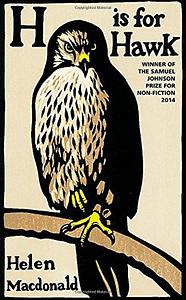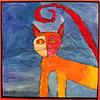Take a photo of a barcode or cover
emotional
hopeful
reflective
medium-paced
I enjoyed this a lot. She is a very good writer, often using words I don't know, but in a way that you get the meaning anyway. She has suffered a great loss, so the training of her hawk is wrapped up in grief, a searching for meaning and purpose, and personal healing. The hawk is there to tie it all together.
A very insightful and well-written book. I found it a bit difficult to read, knowing the hawk was captive.
adventurous
challenging
emotional
informative
reflective
medium-paced
This book came across as a surprise, the biggest surprise for me though was how much I enjoyed a work of non-fiction. Especially since I didn't know it was non-fiction going in.
H is for Hawk is a strange amalgamation of a personal journal, hawk training guide, and biography of the late author T.H. White. If while reading those three items you find yourself confused, you are in good company. The book can come across erratic as it always seems to be shifting in it's focus. This also had the effect of making it difficult to get an emotional footing in the door. The book does a good job of connecting everything near the end, but in the meantime, the reader (or me specifically) can easily get lost in the references to 18th century austringer practices.
However in the hectic nature of the material, there is a deeply personal and touching accounting of how one deals with loss. Macdonald ascribes a certain sanctity to hawking that removes the outside world, and let's you feel as if you are lost in some random English field. The narrative is handled differently though. While there are many pages devoted to the training of hawks, and to T.H. White's life (spoiler alert: he trained hawks as well), the author's personal life is handled with a bird's eye view. There are passing references to some of the difficulties that the author went through after her father passed, but the book instead chooses to fly back into the fields with the hawks. By the end of the novel you realize this is more or less the point of the novel: to show that one can easily affix meaning and significance to things that distract from personal pain. This is a very beautiful and well communicated thought, I just found myself wishing she had followed it up more on her side of the story.
In the end, I now know much more about falconry and T.H. White then I could have ever hoped to. Seeing as I had no idea that this book would extensively cover either of those, I'll take the very well made emotional journey that Macdonald presents as a bonus.
H is for Hawk is a strange amalgamation of a personal journal, hawk training guide, and biography of the late author T.H. White. If while reading those three items you find yourself confused, you are in good company. The book can come across erratic as it always seems to be shifting in it's focus. This also had the effect of making it difficult to get an emotional footing in the door. The book does a good job of connecting everything near the end, but in the meantime, the reader (or me specifically) can easily get lost in the references to 18th century austringer practices.
However in the hectic nature of the material, there is a deeply personal and touching accounting of how one deals with loss. Macdonald ascribes a certain sanctity to hawking that removes the outside world, and let's you feel as if you are lost in some random English field. The narrative is handled differently though. While there are many pages devoted to the training of hawks, and to T.H. White's life (spoiler alert: he trained hawks as well), the author's personal life is handled with a bird's eye view. There are passing references to some of the difficulties that the author went through after her father passed, but the book instead chooses to fly back into the fields with the hawks. By the end of the novel you realize this is more or less the point of the novel: to show that one can easily affix meaning and significance to things that distract from personal pain. This is a very beautiful and well communicated thought, I just found myself wishing she had followed it up more on her side of the story.
In the end, I now know much more about falconry and T.H. White then I could have ever hoped to. Seeing as I had no idea that this book would extensively cover either of those, I'll take the very well made emotional journey that Macdonald presents as a bonus.
A touching read. I can imagine revisiting this book a few years down the line. I learned a lot of new stuff about falconry and enjoyed being along for the emotional journey Helen went on through this recounting.
slow-paced
emotional
informative
reflective
sad
tense
slow-paced
Well worth the reading. MacDonald gives a real perspective of living with grief. I knew nothing about birds of prey or falconry, so I found her writing interesting and informative. I had already read "The Once and Future King," so I also enjoyed her discussions of T.H. White and his life.
dark
emotional
reflective
relaxing
sad
slow-paced
It took me approximately 2 months to finish this book, when normally I can finish one of this length in a couple days. I am out of practice with reading physical books, and this one was not exactly a page turner nor an easy read. The verbiage and analysis in this book was really challenging to me.
I looked up the definitions of many, many words (a la "argillaceous"), but the flow of the text was generally soothing if I didn't stress about specifics.
Likewise, I frequently got lost in what, exactly, the author was getting at with descriptions of White, the author of Goshawk and The Sword and the Stone who is apparently known for his incredible incompetence with his first bird, Gos, who heeventually lost and never recovered .
White, to me, is not a loveable character (or person, I guess). Probably partly as a result of the abuse he suffered as a gay man in a severely homophobic society, so I don't exactly fault him for that. A miserable, lost, prideful person with violent and unsettling desires. I'm glad that White added a post-script to The Goshawk detailing his failings and what he should have done with Gos. I find it interesting and not exactly unreasonable that one of the responses the book got was of outrage and despair from a fellow hawk lover.
With all that said, I appreciated the way this book deals with grief in general. The author's loss is a major part of the story, of how she ended up with a hawk at all, but I felt drawn out of the grief and loss by the distraction of her adventure with the hawk. Which was the point, I think. It was why she got the hawk at all, as a means to distract from the pain she was feeling (I think -- my critical analysis muscles feel very weak and my faulty memory doesn't help).
Chapter 11 made me laugh out loud and also cry at different moments. The emotional whiplash of a single chapter was something special, to me.
There was a typo on page 206 -- "them them"
The injury Helen suffered at her own hand while quickly butchering a pheasant is almost exactly like the injury my sister suffered (albeit by the blade of an unguarded mandolin slicer).
The last couple lines seemed like Helen saying goodbye to her father, "'I will miss you'...there was no reply, there was nothing to explain." and then leaning into the comfort of community as a means to heal. Immediately after saying goodbye to her hawk, she joins Tony in his house where it is warm and lovely. It almost felt anti-climactic...but the more I thought about it the more I appreciated the ending. Grief and loss have no real end. Life just keeps going.
I think this is a great book and I understand why it is so acclaimed. I did enjoy it, despite finding it a bit challenging in multiple ways. I think that whenever I suffer a loss as deep as a father, I will pick up this book again and find incredible solace in it. Until then, I have no interest in re-reading this book.
I looked up the definitions of many, many words (a la "argillaceous"), but the flow of the text was generally soothing if I didn't stress about specifics.
Likewise, I frequently got lost in what, exactly, the author was getting at with descriptions of White, the author of Goshawk and The Sword and the Stone who is apparently known for his incredible incompetence with his first bird, Gos, who he
White, to me, is not a loveable character (or person, I guess). Probably partly as a result of the abuse he suffered as a gay man in a severely homophobic society, so I don't exactly fault him for that. A miserable, lost, prideful person with violent and unsettling desires.
With all that said, I appreciated the way this book deals with grief in general. The author's loss is a major part of the story, of how she ended up with a hawk at all, but I felt drawn out of the grief and loss by the distraction of her adventure with the hawk. Which was the point, I think. It was why she got the hawk at all, as a means to distract from the pain she was feeling (I think -- my critical analysis muscles feel very weak and my faulty memory doesn't help).
Chapter 11 made me laugh out loud and also cry at different moments. The emotional whiplash of a single chapter was something special, to me.
There was a typo on page 206 -- "them them"
The injury Helen suffered at her own hand while quickly butchering a pheasant is almost exactly like the injury my sister suffered (albeit by the blade of an unguarded mandolin slicer).
I think this is a great book and I understand why it is so acclaimed. I did enjoy it, despite finding it a bit challenging in multiple ways. I think that whenever I suffer a loss as deep as a father, I will pick up this book again and find incredible solace in it. Until then, I have no interest in re-reading this book.
Graphic: Animal death, Gore, Grief, Death of parent
Moderate: Animal cruelty, Homophobia, Mental illness, Pedophilia, Xenophobia, Blood, Colonisation, Injury/Injury detail
Minor: Misogyny, Antisemitism, War
emotional
informative
reflective
medium-paced






